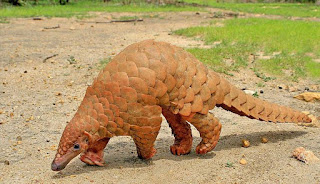In a preamble to this article written below, Nigerians and others alike need to know much more about the challenges and dangers Pangolin Trafficking is doing to the world.
In a news publication last year, 2021 by Vanguard Newspaper, men of the Nigeria Customs Service (NCS) revealed that 1,104.5kg of Pangolin scales worth N1.728 billion were intercepted. The full news story is found in this link Pangolin Trafficking in Nigeria
Pangolins are mammals just like human beings. Pangolins have scaly body, and wrap up into a ball to protect themselves against predators. Pangolins are also called 'scaly anteater' because of their unending appetite for ants.
In further describing what Pangolins are, World Wildlife Fund (WWF) defined Pangolins as "animals which have no teeth. Pangolins pick up food with their sticky tongues, which can sometimes reach lengths greater than their body."
Based on scientific findings and research, Pangolin family is further broken down into genus and species. The singular of Pangolins is Pangolin. Pangolins have three genera (singular:genus) namely: Phataginus, Smutsia and Manis, just as human beings have Homo, as their genus name. In addition, while the specie name of human beings is sapiens, Pangolins have various species.
The scientific name (combination of genus and species) of human beings is Homo sapiens, while examples of the scientific names of three different species of Pangolins found in Nigeria and some sub-Saharan African countries include: Smutsia gigantea, called the giant ground pangolin; Phataginus tetradactyla, known as the black-bellied tree pangolin and, Phataginus tricuspis, called the white-bellied tree pangolin.
 |
| Pangolins are found in Nigeria |
Pangolins are found in some states in Nigeria such as Ogun, Benue, Kwara, Taraba, Kogi, and Niger. In recent times, notorious activities of Pangolin traffickers have been reported in Ogun state, South-West Nigeria.
Nigeria, a country in sub-Saharan Africa, has one of the largest numbers of Pangolins. Recently, some of the Pangolins found in Nigeria, are being endangered as a result of poaching and trafficking. In a publication on November 4, 2021 by Sciencedaily.com, it stated that "with Asian species (of Pangolins) dangerously depleted, global black markets have turned to Africa, and Nigeria has become the continent's pangolin trafficking 'hub'. Nigeria-linked pangolin seizures in the last decade alone amount to at least 800,000 -- but possibly close to a million."
The challenges of poaching and trafficking of Pangolins will continue to rear its ugly head, because there is a high demand for Pangolins' meat, as well as their scales for fashion and ornaments in some Asian countries such as China and Vietnam.
Going forward, more efforts should be put in place by authorities in Nigeria to checkmate the poaching and trafficking of Pangolins. This is vital because a depletion or extinction of Pangolins would have a negative impact on the ecosystem, as Pangolins help control ants population. Therefore, all anthropogenic activities leading to the depletion and trafficking of Pangolins in Nigeria, and other countries should be put to a stop.
Oladele Hakeem Olaniyan , who lives in Nigeria wrote this article
Comments
Post a Comment